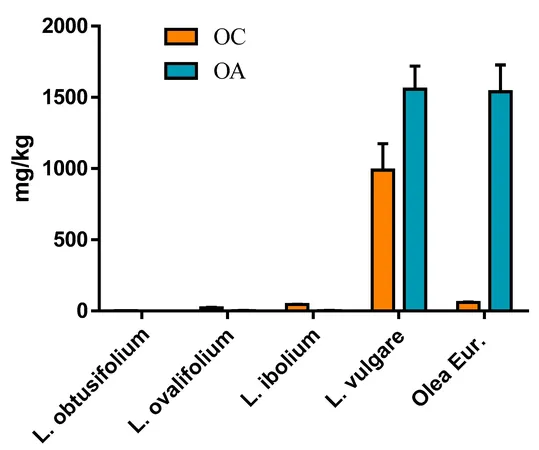
Revolutionary Discovery: Privet Leaves as a Potent Source of Anti-Inflammatory Compounds
2025-01-13
Author: Mei
Introduction
In a groundbreaking study published in the *International Journal of Molecular Sciences*, researchers from the Monell Chemical Senses Center have unveiled that privet leaves possess noteworthy amounts of oleocanthal and its closely related compound, oleacein—two powerful anti-inflammatory agents. This revelation could pave the way for new treatments for a variety of health issues.
Discovery Background
The journey toward discovering oleocanthal's anti-inflammatory properties began when Monell scientists observed that the unique throat-tingling sensation experienced while consuming high-quality extra virgin olive oil resembled that produced by ibuprofen, a common anti-inflammatory medication. With further investigations, they identified that this distinctive “burn” stems primarily from oleocanthal, which activates the TRPA1 ion channel linked to the trigeminal nerve.
Significance of Compounds
Dr. Catherine Peyrot des Gachons, Senior Research Associate at Monell, emphasized, "These compounds are believed to be responsible for many health benefits attributed to extra virgin olive oils and the broader Mediterranean diet." The compounds not only contribute to culinary delights but possess promising implications for human health.
Previous Research
Previous research has suggested that oleocanthal and oleacein may have therapeutic potential for serious conditions such as cancer and Alzheimer’s disease. However, most of these studies have remained confined to cell-based if not animal models. There is a pressing need for rigorous clinical trials involving human participants to fully establish the health benefits of these compounds. Yet, due to financial constraints and access issues, many organizations hesitate to fund such extensive studies.
Exploring Alternative Sources
Traditionally, sourcing sufficient quantities of oleocanthal and oleacein for human trials has relied heavily on extra virgin olive oil due to the leaves of olive trees containing minimal amounts of these compounds. In response, the Monell research team shifted gears and turned their attention to the privet (Ligustrum vulgare)—a common, fast-growing shrub relative to the olive family—that offers a promising and cost-effective alternative source.
Research Findings
The research team confirmed the presence of oleocanthal and oleacein within the leaves of common privet and highlighted the potential to extract these compounds at scale efficiently. Interestingly, the study also identified marked differences among various privet species regarding their concentrations of these beneficial compounds, with seasonal leaf collection and developmental stages showing minimal influence on these concentrations.
Conclusion
Dr. Peyrot des Gachons concluded, "This new study is a significant part of Monell's ongoing quest to deepen our understanding of oleocanthal's pharmacology, with the ultimate objective of improving human health." With a growing body of evidence supporting the health benefits of these compounds, the future looks promising for privet leaves as a source of powerful anti-inflammatory agents that could revolutionize treatments for inflammation-related diseases.
Future Prospects
Stay tuned as this significant discovery unveils more about the healing powers of nature, and possibly opens a new chapter in the quest for effective, natural remedies!
 Brasil (PT)
Brasil (PT)
 Canada (EN)
Canada (EN)
 Chile (ES)
Chile (ES)
 Česko (CS)
Česko (CS)
 대한민국 (KO)
대한민국 (KO)
 España (ES)
España (ES)
 France (FR)
France (FR)
 Hong Kong (EN)
Hong Kong (EN)
 Italia (IT)
Italia (IT)
 日本 (JA)
日本 (JA)
 Magyarország (HU)
Magyarország (HU)
 Norge (NO)
Norge (NO)
 Polska (PL)
Polska (PL)
 Schweiz (DE)
Schweiz (DE)
 Singapore (EN)
Singapore (EN)
 Sverige (SV)
Sverige (SV)
 Suomi (FI)
Suomi (FI)
 Türkiye (TR)
Türkiye (TR)
 الإمارات العربية المتحدة (AR)
الإمارات العربية المتحدة (AR)